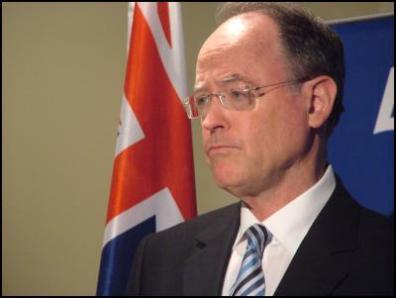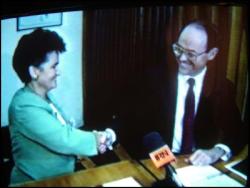Don Brash and the “Strategic Deficit”
Don Brash and the “Strategic
Deficit”

 Acclaimed New Zealand documentary maker,
Alister Barry, has been following Donald Brash's career for
nearly two decades. Last year his documentary films
'Someone Else's Country' and 'In a land of Plenty' screened
for the first time ever on national
television.
Acclaimed New Zealand documentary maker,
Alister Barry, has been following Donald Brash's career for
nearly two decades. Last year his documentary films
'Someone Else's Country' and 'In a land of Plenty' screened
for the first time ever on national
television.“Strategic deficit” refers to a political technique used by President Ronald Reagan and his new right budget director, David Stockman to downsize the state. First, you give massive tax cuts which in succeeding years leads to huge budget deficits and borrowing.
The intent of the tax cuts isn’t to stimulate the economy as Reagan publicly claimed or even as payback for his political backers, as his critics accused.
The real intent of Reagan’s massive tax cuts was to create, in Stockman’s words, a "strategic deficit" that would give you an argument for cutting back the programs that weren't desired."
In Reagan’s case the huge deficit was used to cut back public housing, food stamps (vouchers used by the destitute in America to pay for food), and welfare benefits. The “strategic deficit” freed President Reagan from having to justify these cuts and their human cost. All he had to do was point to the deficit and explain that the programmes were simply unaffordable.
President George W. Bush has also made tax cuts the centre piece of his economic programme and for the same reason.
In New Zealand in the late 1980s we had our own version of the use of the “strategic deficit”.
In 1988 finance minister Roger Douglas gave massive tax cuts while at the same time selling off most of our state owned enterprises. The asset sales were, we were told, to pay back government borrowing. Years later Douglas mused that perhaps he should have been more honest and told the public that the real reason for the asset sales was his ideological conviction that privatisation is a good thing in itself.
In 1991 another deficit crisis was claimed by National Party finance minister, Ruth Richardson, as the reason for slashing government spending and huge cuts to social welfare benefits. Tens of thousands of beneficiaries were pushed below the official poverty line and into the queues at foodbanks. For Ruth Richardson all this constituted a rapid advance in the new right revolution in New Zealand. But after Ruth had gone there remained much unfinished business.
It is this unfinished business which Don Brash intends to address should be become Prime Minister after the election. And his principle technique for making relatively quick work of it will be his creation of a “strategic deficit”.
As we wait for the details of National’s tax cut package commentators and economists speculate over their affordability. Labour strategists take comfort in the figures which show that a politically significant cut of say $50 a week for middle income earners is fiscally impossible. Impossible for serious and responsible types like Michael Cullen perhaps, but not for revolutionaries like Roger Douglas, Ruth Richardson or Don Brash.

I watched the studio debate on TVNZ on tax cuts, the one starring the terribly objective tax expert John Sherwin. I was struck by the vehemence of the supporters of tax cuts: the small and big businessmen, the business lobby group representatives, the occasional young ACT supporter. It struck me that they weren’t really interested in the arithmetic. They had a bigger idea in their eyes. Unconsciously perhaps, they understand and support the idea of a “strategic deficit”. They were thinking about the unfinished business, not the $50.
So what sort of cuts is Don Brash thinking of? In a word, massive. When Don Brash was National’s finance spokesperson in 2003 he explained to the party’s national conference that he believed government spending should be reduced as a percentage of GDP by about 5% over ten years. As Rod Oram explained in the Sunday Star Times (July 31st, p.D2), if Brash had been in charge and applying his formula over the last six years he would have spent $4 billion less this year than Michael Cullen.
Cutting spending by $4 billion could be achieved by halving the health budget, or halving the education budget, or cutting the entire law and order, defence and transport budgets. This is the order of magnitude of Don Brash’s intended assault on public services. This is what he dreams of doing once he is in charge.
Rod Oram asked Brash how he was going to a apply his thinking in his first term as Prime Minister. Brash replied that he “hadn’t really thought about that”. Like Roger Douglas and Ruth Richardson, he prefers to explain his intentions to voters after the election. His first priority is to persuade us to put him in power.
Don Brash can and will create his Orewa Three and he feels perfectly comfortable about the disruptive effects one, two and ten years out. It will be a $50 a week tax cut. This can and will be paid for, in the short term by borrowing and in the long term with asset sales, massive cuts to services and welfare payments. The details can be worked out later. First he creates the “strategic deficit.”
Roger Douglas had a ten point list of political pointers for new right revolutionaries. They included being bold, moving fast, keeping your critics guessing. Don Brash’s strange air of confidence is no act. He knows what has to be done and he will do it.
ENDS


 Richard S. Ehrlich: Pakistan & China Down 6 Indian Warplanes
Richard S. Ehrlich: Pakistan & China Down 6 Indian Warplanes Keith Rankin: War In Sudan
Keith Rankin: War In Sudan Ramzy Baroud: Netanyahu's Endgame - Isolation And The Shattered Illusion Of Power
Ramzy Baroud: Netanyahu's Endgame - Isolation And The Shattered Illusion Of Power Jeremy Rose: Starvation Of Gaza A Continuation Of A Decades-old Plan
Jeremy Rose: Starvation Of Gaza A Continuation Of A Decades-old Plan Keith Rankin: The Aratere And The New Zealand Main Trunk Line
Keith Rankin: The Aratere And The New Zealand Main Trunk Line Gordon Campbell: On The Mock Horror Over Political Profanity
Gordon Campbell: On The Mock Horror Over Political Profanity